What is data privacy and why it matters: A complete guide
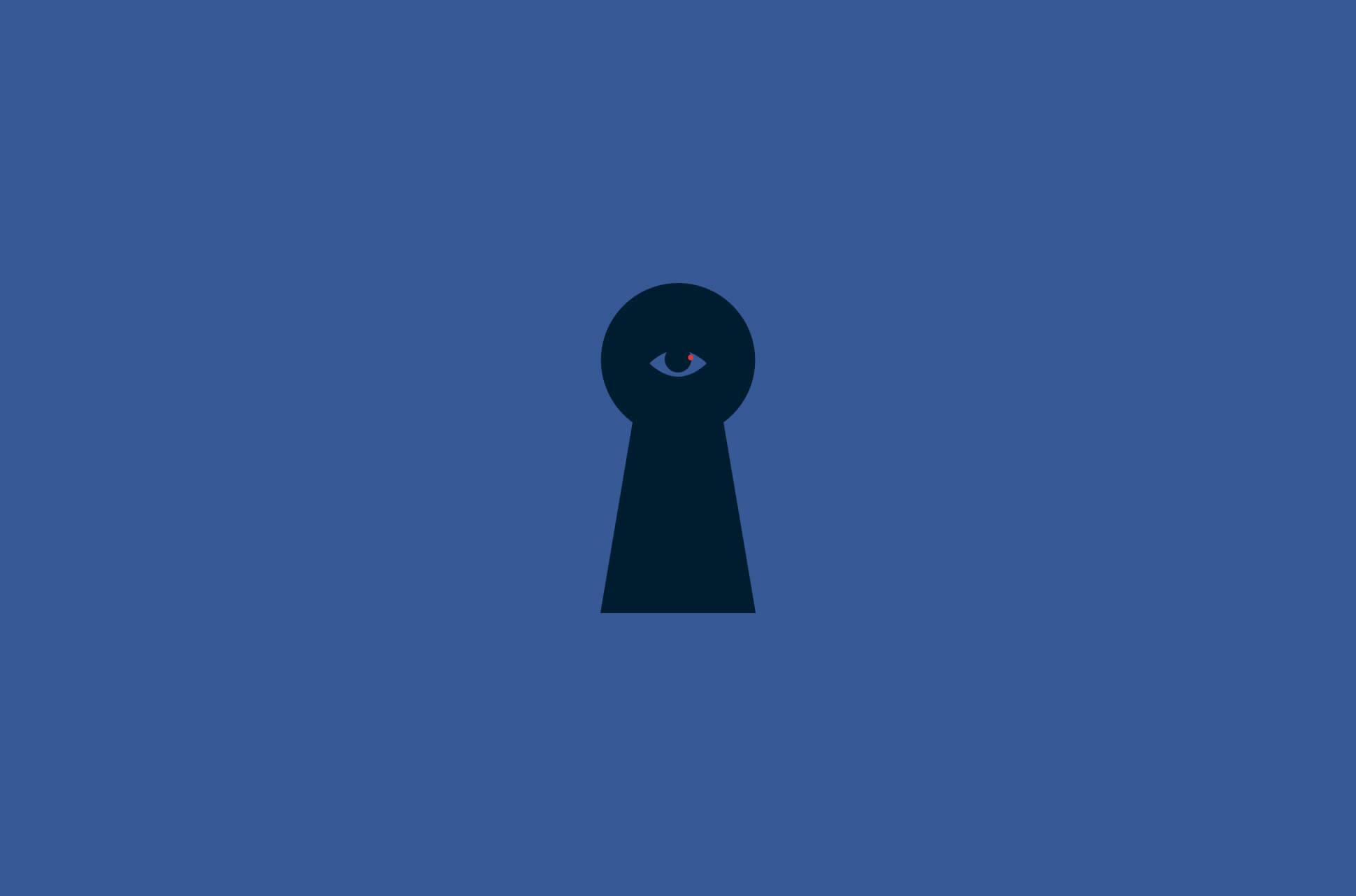
In the online world, just about every app, company, and website processes and uses your data in some way. Ideally, these companies should be transparent about how they collect and use your data, but unfortunately, that’s not always the case.
I created this guide to help you understand how your data is collected, the risks involved with its usage, and what regulations exist to protect your privacy. I've also added tips to help you stay safe from data misuse.
Expert tip: One of the best ways to keep your data secure is to use a VPN. ExpressVPN encrypts your internet traffic with AES-256, preventing third parties like hackers, ISPs, or network operators from seeing your online activity. It also has built-in DNS protection and a kill switch to prevent accidental data leakage.
What is data privacy?
Data privacy is the right of individuals to control how their personally identifiable information (PII) is collected, used, and shared. PII refers to any data that links to your identity, such as your email address, full name, home address, social security number, and more. Data privacy practices and laws protect this data from misuse or unauthorized access.
Key concepts in data privacy

Data collection
Data collection is the process of gathering personal information from users, such as names, emails, IP addresses, or behavioral data. Ethical data collection should be transparent and based on user consent. There should also be opt-out settings for aggressive data collection policies such as behavioral data scraping.
Data breach
A data breach occurs when personal data is accessed or disclosed without authorization, often due to poor data privacy standards or cyberattacks. Breaches can lead to threats including identity theft, financial harm, or a loss of reputation. In some circumstances, they can also lead to extortion or company sabotage.
Data access
Data access refers to who at a company can view or interact with personal information and under what conditions. Without proper data access control, unauthorized parties are free to collect data that a company gathered and use it for anything from targeted ads to phishing schemes.
Data storage
Data storage is about how and where personal data is kept, including cloud platforms, physical servers, or databases. Secure storage practices, such as encryption, frequent system backups, and compliance logs, help prevent unauthorized use and protect data privacy.
Data privacy vs. data security
Data privacy is about the laws and policies in place to define who can access your data and what they can do with it. It concerns the ethical and legal use of personal information, from data processing to usage and storage. For example, the General Data Protection Regulation (GDPR) is an EU data privacy law that governs privacy rights and also mandates data security measures to protect personal data.
Data security, on the other hand, refers to the technical procedures and tools used to keep data secure. In short, it’s about how you protect your data from outsiders. Tools like VPNs, secure firewalls, and multi-factor authentication (MFA) all fall under the data security umbrella. Business-specific data security tools include incident response plans, automated security tools, and more.
Why is data privacy important?
Data privacy is crucial because it protects you from unauthorized access to and misuse of your information. Without data privacy protections, sensitive data like financial records, health information, and identity documents can be exposed or collected for malicious reasons, leading to identity theft, discrimination, or financial loss.
Even if there’s no malicious intent, good data privacy protections help you avoid unwanted tracking on websites, where information about you can be collected and used for targeted advertising.
The impact of data privacy on individuals
When data privacy is breached, people face real-world consequences. These can include financial harm, identity theft, a loss of reputation, or, in some cases, even blackmail and extortion.
Even seemingly harmless data, like your browsing history or location data, can be pieced together to create a detailed profile without your consent. These profiles can potentially be used for practices such as price discrimination (where stores alter their displayed pricing based on your user profile). Companies also sell these profiles to third parties for use in targeted ads, spam mail, or even phishing scams.
Institutional data privacy violations can erode trust in government agencies and large corporations over time, even if they’re not participating in malicious activities. This distrust can serve to worsen data privacy by making people more likely to disregard advisory warnings, reporting websites, or federal data privacy recommendations.
The importance of data privacy for businesses
For businesses, protecting customer data isn’t just a way to promote trust between the customer and company; it’s the law in many places. Organizations that fail to uphold strong data privacy standards face legal action and steep penalties.
Minimizing, anonymizing, and reducing the overall amount of data that your organization collects also leads to lower costs and improved data quality. Data is expensive to process and store, and the more you collect, the longer it takes to process.
Data privacy laws and regulations
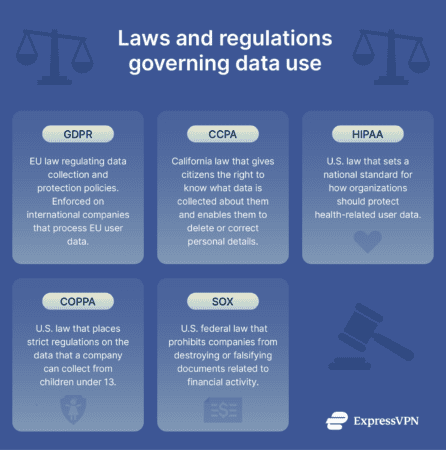
General Data Protection Regulation (GDPR)
GDPR is a multi-hundred-page-long data privacy law drafted by the EU in 2016. It imposes strict privacy regulations that prevent businesses from exploiting customer data, for example, by not disclosing what data they’re collecting or deliberately hiding information about data breaches.
It also allows the EU to penalize international companies for misusing EU citizens' data.
Failure to achieve GDPR compliance comes with a fine that is capped at €20 million or 4% of the company’s global revenue—whichever is greater. Users who had their data misused can also seek compensation for any damages incurred.
California Consumer Privacy Act (CCPA)
The CCPA is a California state law enacted in 2018 that gives California residents tighter control over what personal information a business can collect about them. It gives citizens the right to know what info is being collected, to delete data, and to opt out of data collection.
The CCPA is one of many state-level data privacy laws, such as the Colorado Privacy Act or Virginia’s Consumer Data Protection Act. Each of these laws defines what rights a citizen has over their data.
Health Insurance Portability and Accountability Act (HIPAA)
HIPAA is a 1996 U.S. law that sets a national standard for protecting health-related data privacy. It protects patients from having their health information disclosed without their consent.
Healthcare providers, health plans, and clearinghouses must comply with HIPAA regulations. Violations can result in significant civil or even criminal penalties, including fines and potential jail time for severe infractions.
Children’s Online Privacy Protection Act (COPPA)
COPPA is a U.S. law passed in 1998 that protects children’s online privacy. It places strict limits on the data that a company can collect from anyone under 13. It also requires any business that processes children’s data to obtain verifiable parental consent before doing so. Noncompliance with COPPA can come with hefty fines, which can apply to a wide range of organizations.
The Sarbanes-Oxley Act (SOX)
SOX is a U.S. federal law that was enacted in 2002 after major corporate accounting scandals, like Enron and WorldCom. While not a data privacy law in the traditional sense, SOX impacts data management and recordkeeping practices that can overlap with data protection efforts.
Namely, under SOX, public companies are required to implement strict internal controls and maintain secure, accurate records of financial activities. Destruction, falsification, or failure to maintain records can lead to criminal penalties, including fines and imprisonment.
Common data privacy challenges
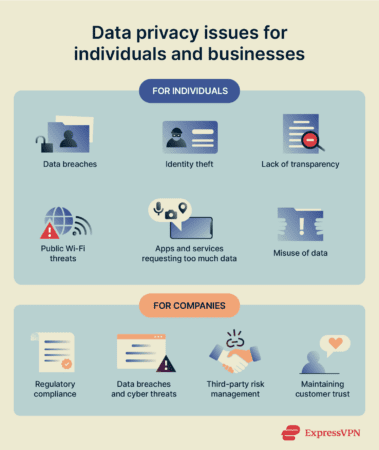
Challenges for individuals
- Data breaches: If a company has a data breach, it exposes your personal information. This can have lasting consequences; hackers can sell your data on the dark web, which leads to phishing scams, malware attacks, and more.
- Identity theft: If a bad actor obtains personal documents or sensitive information, they can use it to steal your identity. The best way to protect yourself against identity theft is with a tool like ExpressVPN Identity Defender (currently only available to U.S. users).
- Lack of transparency: Many companies collect vast amounts of user data, such as behavioral habits, location, and even biometric details, all without disclosing what they’re scraping and why. Some mask this through lengthy and hard-to-read terms of service, making it harder to take informed decisions about which websites to trust.
- Threats on public Wi-Fi: Hackers can intercept people’s sensitive data after they connect to unsecured public Wi-Fi. They often target open Wi-Fi networks at places with a lot of traffic, like cafes and airports.
- Apps and services requesting too much data: Many mobile apps are permission-hungry and demand access to sensitive information that they don’t need to function.
- Misuse of data: Many companies use data in ways that violate people’s privacy. This includes selling it to third-party companies or using it to build customer profiles. Even worse, threat actors can use your info to target you with phishing scams or damage your reputation.
Challenges for businesses
- Regulatory compliance: Businesses must navigate through a complex web of laws and regulations. These state, federal, and international regulations can change frequently. It can require steep investments to bring your organization up to regulatory standards, and it’s expensive to maintain compliance once it’s achieved.
- Data breaches and cybersecurity threats: Data breaches can cause significant financial and reputational damage to a company. They can disrupt its ability to operate, and in some cases, cause a complete shutdown. Worse still, the business can face significant legal consequences.
- Third-party risk management: Reliance on third-party companies is nearly ubiquitous among modern businesses, but these companies often have weak cybersecurity standards. The more an organization needs to rely on third-party tools and data processors, the greater its risk. If you don’t choose your vendors carefully, you leave yourself vulnerable.
- Maintaining consumer trust: Failing to properly handle data can permanently damage or destroy a company's reputation.
How to protect your data privacy
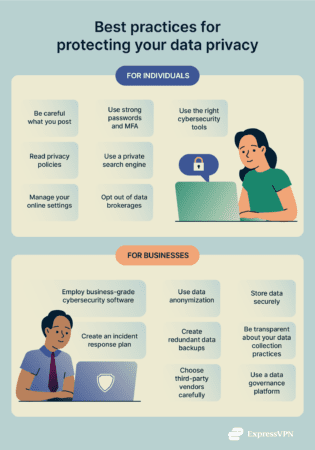
Best practices for individuals
- Be careful what you post online: Whenever you post on social media, you’re sharing information about yourself, such as your location, hobbies, habits, and more. Stay more private by limiting what personal details you share online.
- Use strong passwords and MFA: Create complex passwords for each of your accounts and use a password manager like ExpressVPN Keys to change and store them securely. Also, use multi-factor authentication (MFA) to add an extra layer of security to your accounts by requiring an extra verification step to log in. This can be an SMS code, an email code, biometrics, or an authenticator app, for example.
- Read privacy policies: You should read privacy policies before signing them to get a clear understanding of what you’re agreeing to. If you aren’t comfortable with how the company uses your data, back away before creating an account.
- Use a private search engine: Consider using a private search engine instead of a traditional one. A search engine that cares about data privacy doesn’t track your searches or store your personal information.
- Manage your online privacy settings: There is a range of privacy settings that you can tweak to increase your anonymity. When applicable, turn off location tracking, manage website cookies, and review site and app permissions.
- Opt out of data brokerages: Online data brokers collect and sell your information, but you can usually opt out of these. Visit each data broker's website and follow its opt-out procedure.
- Use the right cybersecurity tools: You should use a VPN with powerful encryption to prevent websites and apps from harvesting your information. ExpressVPN combines a secure VPN with an effective ad and tracker blocker for better online privacy.
Best practices for businesses
- Use business-grade cybersecurity software: As an organization, you’ll need a range of tools to ensure data privacy. This includes user-access controls (UAC) to limit unauthorized access, an antivirus to detect and remove malware, a firewall, and an enterprise-grade VPN to encrypt network data.
- Use data anonymization: Try to only collect data that your company needs to function. If you don’t need personalized data, you should anonymize it by masking it with altered values, generalizing the data so it can’t be used to identify a specific person, shuffling data attribute values, and more. This decreases the damage that a data breach can cause and prevents potential employee misuse of customer data.
- Store data securely: Ensure your data storage process is regulation-compliant by using solutions such as data encryption and comprehensive compliance logs.
- Create an incident response plan: Having an incident response plan is critical for reacting to ransomware attacks and other online threats. With a predefined response, your employees will have a firm protocol for what to do and who to communicate with.
- Be transparent about your data collection: Inform customers about exactly what data you collect and why in an accessible and easy-to-understand way. You should also give your users clear privacy options, such as opt-outs for data collection, and always enforce your own rules.
- Create redundant data backups: By creating redundant data backups, you ensure that your company won’t lose access to important data in the case of data corruption, ransomware attacks, device failure, human error, or natural disasters.
- Use a data governance platform: Data governance platforms are tools that help companies organize, manage, and protect data. Simply put, they make it easier for a business to comply with data collection and management laws.
- Choose third-party vendors carefully: An unsafe third-party vendor can expose your customer data, so carefully vet each vendor you work with. Ensure they’re compliant with all local security requirements, and negotiate contractual provisions for protecting customer data. Also, check for a history of data breaches and prepare a response plan for if that vendor gets breached.
Data privacy technologies
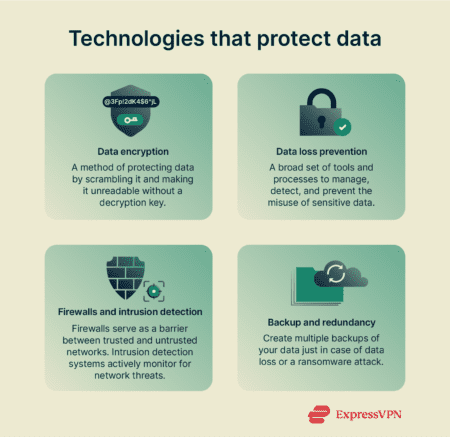
Data encryption
Data encryption translates data into a cipher that gets decrypted once it reaches its destination. It ensures that sensitive information remains secure during the transmission process and is a fundamental aspect of secure data storage. For example, if you’re using ExpressVPN, your data is automatically encrypted using 256-bit AES encryption.
Data loss prevention (DLP)
DLP encompasses a broad set of tools and processes designed to manage, detect, and prevent the misuse of sensitive data. DLP solutions monitor data in motion, at rest, and in use, helping prevent it from being exfiltrated or mishandled. They help maintain regulatory compliance and protect intellectual property.
Firewalls and intrusion detection
Firewalls serve as a barrier between trusted and untrusted networks. They filter out harmful or unwanted network traffic and help prevent unauthorized access to your network based on predefined security rules. Intrusion Detection Systems (IDS) complement a firewall by actively monitoring traffic for known threats and suspicious activities while alerting administrators to security breaches.
Backup and redundancy solutions
Backup and redundancy solutions involve creating multiple copies of your data and storing them in different locations. This way, you have extra backups in case you lose your data due to a cyberattack, device failure, or data corruption. However, data backups contain the same sensitive data as the live version, so they need to be handled very carefully. Ensure you’re following proper data privacy practices to avoid backups becoming a vulnerability within your company.
Future trends in data privacy
Impact of AI on data privacy
AI technology has put automation and advanced data collection tools into everybody's hands. AI reinforces predictive algorithms that can quickly analyze vast amounts of personal data to anticipate behavior, learn preferences, and even discover someone’s identity. This creates serious concerns around consent, transparency, and control over personal information.
The explosive growth of these new technologies requires world governments to create complex regulations. We’ve already begun to see countries start to regulate AI, but these laws are still developing and changing as AI progresses.
Some experts argue that legislators put too much emphasis on AI exceptionalism—the idea that AI needs wholly new laws—when many of the risks posed by AI are already addressed by existing data protection laws. However, the difference lies in scale—modern AI tools work on a far larger scale, are much faster, and are accessible to anyone.
Mobile data privacy
Over time, cellphone app users have demanded more transparent privacy collection policies and greater control over their data. They’ve pushed back against companies with poor privacy policies through lawsuits and boycotts.
For example, after it was revealed in 2018 that Cambridge Analytica was collecting data from millions of Facebook users and using it to aid political elections, consumers banded together to #DeleteFacebook. The scandal ended with Facebook being fined $5 billion by the FTC in what became a landmark victory for consumer privacy.
Ransomware and data protection
Ransomware attacks continue to pose significant threats to data privacy and protection.
Cybercriminals are increasingly leveraging AI to enhance their attack strategies, for example, crafting highly convincing phishing emails and voice phishing schemes. This makes it more challenging for organizations to detect and prevent breaches.
There’s also a shift towards data exfiltration without encryption, where attackers steal sensitive information and threaten to release it publicly unless a ransom is paid. This method increases the pressure on victims but also circumvents traditional data recovery solutions.
Another trend is a rise in Ransomware-as-a-Service (RaaS) models, which have democratized access to sophisticated attack tools for less technically skilled criminals. This has led to a more fragmented threat environment, with groups adopting various tactics to maximize their impact.
FAQ: Common questions about data privacy
What is the difference between data privacy and data security?
What are the key principles of data protection?
How can I ensure my data privacy is protected?
What is the future of data privacy regulations?
Take the first step to protect yourself online. Try ExpressVPN risk-free.
Get ExpressVPN







Comments
Interesting, and scary. But did the end get cut off? Under the last heading, "What you can do about it", it doesn't give any suggestions about what we can do -- except perhaps 'wake up", which is usually a good idea anyway. Some concrete suggestions about how to fight the power would be most welcome!